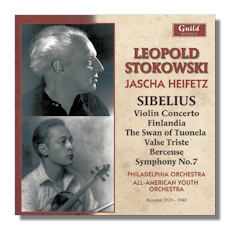
The Internet's Premier Classical Music Source
Related Links
- Sibelius Reviews
- Latest Reviews
- More Reviews
-
By Composer
-
Collections
DVD & Blu-ray
Books
Concert Reviews
Articles/Interviews
Software
Audio
Search Amazon
Recommended Links
Site News
 CD Review
CD Review
Jean Sibelius

- Finlandia, Op. 26 (1930)
- The Swan of Tuonela, Op. 22 #2 (1929)
- Violin Concerto, Op. 47 (1934)
- Valse Triste, Op. 44 #1 (1936)
- Bercuse, Op. 109 #8 (1937)
- Symphony #7 in C Major, Op. 105 (1940) *
Jascha Heifetz, violin
Philadelphia Orchestra/Leopold Stokowski
* All-American Youth Orchestra
Guild 2428 73:22
Okay…nobody did Sibelius better than Stokowski. Their friendship was personal as well as professional. Stokowski visited the composer at his home in Finland at one point in his life. The Stokowski Sound, so full in the Philadelphia recordings, fits Sibelius like a glove to a hand. So, all of the Philadelphia recordings are excellent and while you know it is not stereo, no one listening to these performances would guess their age thanks to the excellent transfers by Peter Reynolds.
First Finlandia: This is undoubtedly a good recording but I cannot stand the music. The ending of the work was the source of the melody for my high school Alma Mater and I forgot the words as soon as I could after leaving Mifflin.
Stokowski did The Swan of Tuonela better than anyone, and I have about six different recordings to compare. While his stereo recording with the National Philharmonic is unsurpassed this early recording still captures the mystery, the flow of the swan down the river and the Stokowski Sound…the raptor he had with that orchestra was amazing.
Now for the meat on the plate: My introduction to the piece was the stereo recording with Walter Hendl, who I had the pleasure to meet and interview a few years ago. As a rule I don't like Heifetz's playing. It reminds me of a saying my students have used about m e: friendly in a distant sort of way. Somehow, however, it fits the Sibelius excellently and various other, more Romantic interpretations somehow seem to make it maudlin. It needs the kind of neo-classical tone. Heifetz's "distant" and "cold" playing, as a rule too intellectual for my taste, somehow fits this music.
Valse Triste and Ravel's La Valse are excellent studies in Valse. I often listen to them back to back. I first heard the music in the film Allegro Non Troppo and to this day I see that cat climbing and walking around in that ghostly house when I listen to it. That version was Herbert Von Karajan. Stokowski is better. It is even more eerie.
Listening to Bercuse for some reason the line from Death of a Salesman "attention must be paid" came to mind. This music sucks you in and demands you pay attention. Listening to it I was wondering if I had ever heard it before. Now I have to go search my library and see if I've another recording.
All of these Philadelphia recordings are masterfully done (double entendre intended). It makes you realize what a synergy Stokowski had created with this orchestra and how his insistence on taking part in the recording process was so helpful in making sure it captured The Stokowski Sound.
Then on to the Symphony #7: I originally released this as President of the Leopold Stokowski Society of America. I got the original from some experimental LPs Columbia made at that time. In fact, the notes in this release say the work was taken from 78s mastered from LPs…? The sound here is vastly improved over the efforts we made in the 1980s. Still, it doesn't have the fullness nor as deep, full bass lines as we hear on RCA.
Guild also released a live performance of this work with the Helsinki City SO in 1953. The sound there, however, is off-putting.
Five stars.
Copyright © 2016, Robert Stumpf II




















